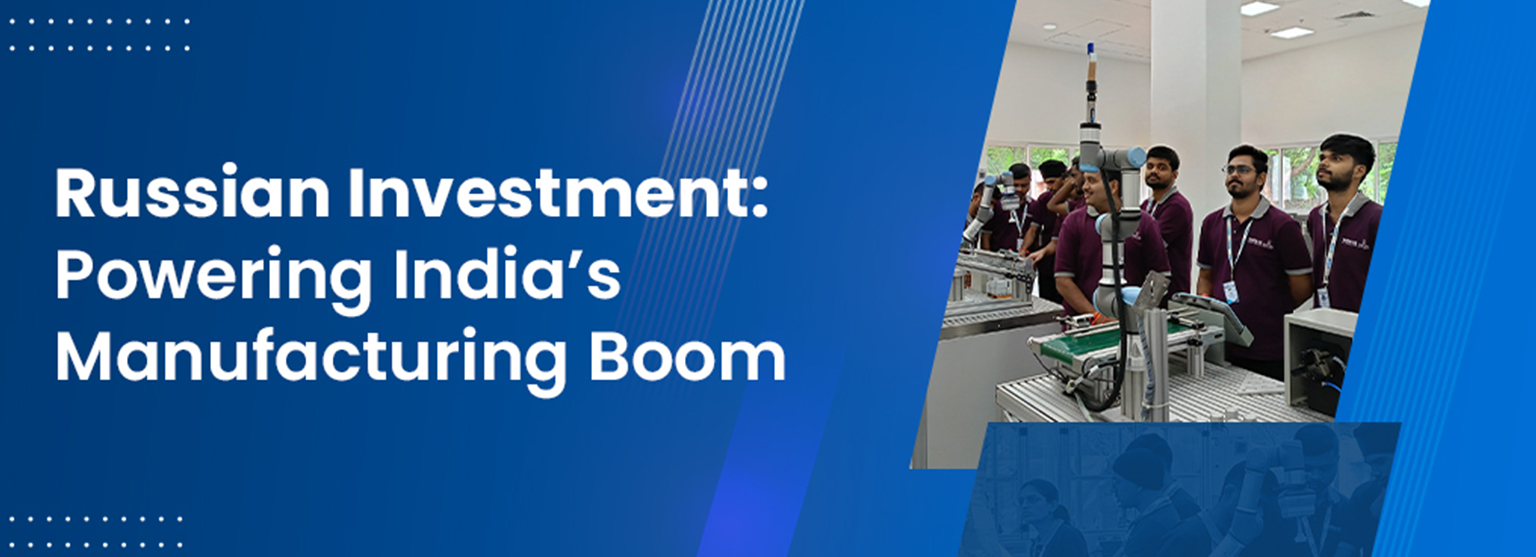


As India faces rising US tariffs, slowing FDI inflows, and supply chain uncertainty, Russia has emerged as an unexpected but crucial partner in India’s manufacturing growth. Russian investment, up over threefold in 2024–25, is anchoring India’s industrial ambitions with unmatched scale and consistency.

Discounted Russian oil and gas are cushioning India’s factories from inflation and energy volatility, while technology transfers in steel, mining, power, and defence are driving India’s Make in India and Atmanirbhar Bharat missions. Together, the two nations are reshaping industrial and energy cooperation and creating tens of thousands of jobs in India across refineries, tech parks, defence units, and battery plants.

Even as global FDI slows, Russian investment in India has hit record highs:
The political backdrop is equally influential. With the US imposing tariffs of 25% or more on several Indian exports, India has sought new allies. Facing Western sanctions, Russia has responded eagerly, offering India not only capital but also critical resources and technology.
Energy remains the cornerstone of Indo-Russian economic ties:

Beyond heavy industry, Russian funds are making deep inroads into India’s tech ecosystem:
These ventures reflect a deeper Russian approach: building long-term digital infrastructure and research capacity within India, not just investing for profit.

Russia’s economic role is now spreading across infrastructure, finance, and defence:

Russian-backed projects are creating thousands of Indian jobs and advancing technical skill development. Engineers, technicians, and contractors are gaining experience in globally competitive environments across refineries, battery plants, and R&D centres.
New training centres, aligned with Russian manufacturing needs, are improving workforce employability while boosting local economies. Simultaneously, nearly 1 million Indian workers are being recruited for Russian industries, an unprecedented two-way workforce exchange.
Russia has become indispensable to India’s industrial future for several reasons:
The Indo-Russian alliance is poised for deeper integration:
As Russia strengthens India’s industrial base, the government is revamping skill development to match this rapid transformation. The Tata Indian Institute of Skills (IIS), a collaboration between the Ministry of Skill Development & Entrepreneurship and the Tata Trusts, stands at the heart of this mission.

Tata IIS is equipping India’s workforce with the technical proficiency, global outlook, and resilience required to capitalise on these emerging Indo-Russian partnerships. As Russian capital and technology weave into India’s growth fabric, IIS ensures the nation’s people are ready to lead it forward.
In today’s unpredictable global economy, this collaboration of capital, capability, and competence may well define India’s next manufacturing leap.
Tata IIS offers a short, comprehensive course in CNC operations with several key benefits, like industry-linked training, and witness practical experience through real-world industrial visits. Learning from industry experts who share valuable insights. Dedicated assistance in securing job opportunities after completion of the course. Work on live projects that simulate real manufacturing scenarios, enhancing your skills and confidence.
Upon completing CNC operator training, you can pursue a wide range of job roles such as:
Becoming a CNC operator typically requires hands-on training. Enrolling in a specialised CNC training program is a good place to start. For example, the Tata IIS CNC course offers comprehensive training that includes industrial visits, expert guest lectures, and placement support to ensure you’re ready for the workforce
One needs to apply to the website of the chosen location – IIS Mumbai, IIS Ahmedabad – after which there will be an entrance test. If you succeed, your admission will be confirmed by paying the minimal admission fees.
One needs to apply to the choice of location’s website – IIS Mumbai, IIS Ahmedabad, after which there will be an entrance test. If you succeed, your admission will be confirmed by paying the minimal admission fees.

Inspired by the tree of knowledge, this logo implies a tree with interspersing dots representing various skills that the institute offers, making it a wholesome skilful tree. The tree’s bark represents individuals with different mindsets coming together with a common purpose of growth. Lastly, one can subtly see the acronym IIS which also represents students as figurines.

To date, we have trained around 650 students. Our alumni are working with notable companies, such as Torrent Power, Powellite Electricals, Tata Motors, Bajaj Auto, and L&T. . Equipped with holistic technical and business skills, many alumni have also chosen the path of entrepreneurship to realise their dreams.
We firmly believe in inclusion. Identifying segments that need us the most is one of our goals. We are mindful of reaching the tribals and marginalised and ensuring maximum women participation.

Learning from the industry is at our core. Our industry partners are deeply involved, right from course design and delivery to recruitment. Our current partners include Fronius, Universal Robots, SMC, Phillips Machine Tools, Multivista, Fanuc, MIR, Markforged, Schneider Electric, Lincoln Welders, Hexagon, Formlabs, ABB, Festo, Ather, Tata Motors, Thermax, Larsen & Toubro, Bajaj Auto Ltd., Carraro, Marriott, Indian Accent, Taj, Lollo Rosso, Tomato’s, Ramada by Wyndham, Novotel, La Milano Pizzeria, Renaissance Hotels, The Fern, Tatr, IFEA, The Job Plus, Happy Faces, Sewa.

The campus is situated on a 4.17-acre land parcel at Chunabhatti inside the National Skill Training Institute campus in the state of Maharashtra. The first phase of development comprises a 22,500-square-foot facility housing advanced manufacturing and electric vehicle laboratories. The facility also includes classrooms and advanced computer laboratories for training in allied areas, providing trainees with a real-world environment akin to working in the manufacturing industry. It is equipped to train approximately 190 students at a time.
Spanning over 2.5 lakh square feet, the campus features infrastructure that includes training facilities, hostels, and dedicated spaces for student activities, supporting comprehensive learning and growth.